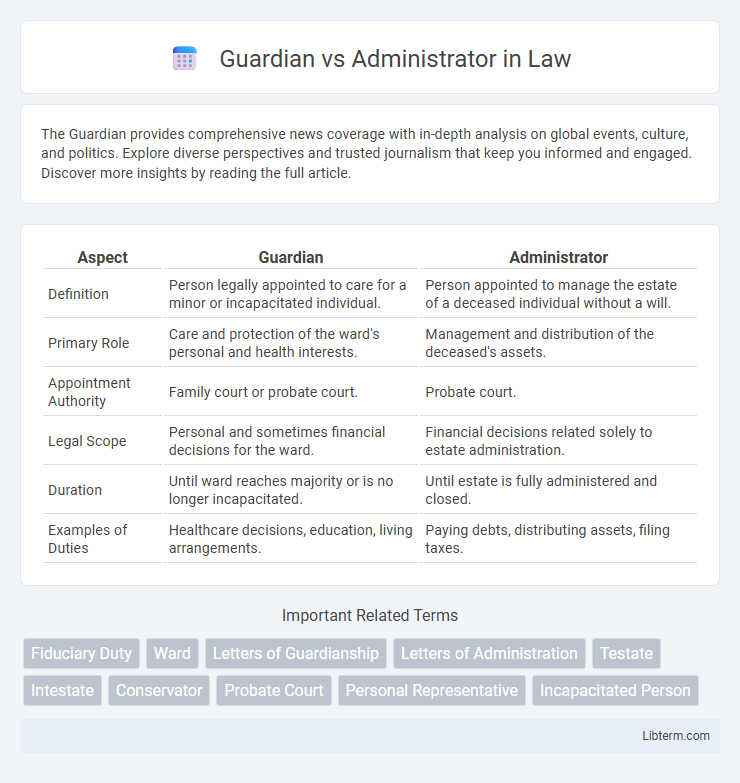The Guardian provides comprehensive news coverage with in-depth analysis on global events, culture, and politics. Explore diverse perspectives and trusted journalism that keep you informed and engaged. Discover more insights by reading the full article.
Table of Comparison
| Aspect | Guardian | Administrator |
|---|---|---|
| Definition | Person legally appointed to care for a minor or incapacitated individual. | Person appointed to manage the estate of a deceased individual without a will. |
| Primary Role | Care and protection of the ward's personal and health interests. | Management and distribution of the deceased's assets. |
| Appointment Authority | Family court or probate court. | Probate court. |
| Legal Scope | Personal and sometimes financial decisions for the ward. | Financial decisions related solely to estate administration. |
| Duration | Until ward reaches majority or is no longer incapacitated. | Until estate is fully administered and closed. |
| Examples of Duties | Healthcare decisions, education, living arrangements. | Paying debts, distributing assets, filing taxes. |
Understanding the Roles: Guardian vs Administrator
A Guardian is legally appointed to protect and manage the personal and financial interests of a minor or incapacitated individual, focusing primarily on their well-being and daily care decisions. An Administrator is designated to handle the estate and financial affairs of a deceased person who died intestate, ensuring proper management and distribution of assets according to state laws. Understanding these roles clarifies that Guardians oversee individual care, while Administrators manage property and estate matters.
Core Responsibilities of a Guardian
A Guardian primarily focuses on the personal well-being, health, and daily care decisions of a ward, ensuring their safety and managing healthcare needs. They are responsible for overseeing living arrangements, access to medical treatment, education, and general welfare. Guardianship emphasizes supporting the ward's personal development and protecting their rights in personal matters.
Key Duties of an Administrator
An administrator manages and distributes a deceased person's estate according to the law when there is no valid will, handling tasks such as inventorying assets, paying debts, and filing tax returns. They ensure all creditors are paid and the remaining assets are distributed to rightful heirs under intestacy laws. Unlike a guardian who manages personal and financial matters for a living person, an administrator's role is strictly related to estate settlement after death.
Legal Authority Comparison
Guardians have legal authority primarily to make personal, healthcare, and lifestyle decisions for incapacitated individuals, whereas administrators are empowered to manage the financial affairs and property of a deceased person's estate during probate. Guardianship involves oversight of personal wellbeing under court supervision, while administration entails executing wills and distributing assets in accordance with state laws. The scope of a guardian's authority is centered on the individual's best interests, while an administrator's authority is fiduciary, focusing on asset management and debt settlement.
Decision-Making Powers Explained
Guardians hold comprehensive decision-making powers over personal, medical, and sometimes financial matters for individuals unable to manage their affairs, ensuring their well-being and protection. Administrators primarily oversee financial and property management decisions, handling asset distribution, bill payments, and legal obligations without intervening in personal care choices. The scope of authority depends on court appointments and jurisdictional laws, delineating guardianship as broader in personal care, while administration concentrates on fiscal responsibilities.
When is a Guardian Appointed?
A guardian is appointed when an individual is unable to manage their personal, financial, or medical affairs due to incapacity or minority. This appointment typically occurs through a court order after evaluating the person's mental or physical condition and best interests. Guardians are commonly assigned for minors, elderly individuals with dementia, or adults with disabilities requiring ongoing care and decision-making support.
When is an Administrator Necessary?
An administrator is necessary when the individual's estate requires formal probate proceedings to manage and distribute assets, especially if there is no valid will designating a personal representative. Courts appoint an administrator to oversee estate settlement, resolve debts, and ensure lawful distribution under state laws. This role differs from a guardian, who manages personal care and decision-making for incapacitated individuals rather than estate administration.
Rights and Limitations in Each Role
A guardian holds the right to make personal, medical, and residential decisions for a ward but is limited by the court in managing financial affairs unless also appointed as a conservator. An administrator's role, typically involving estate administration, grants the right to collect and distribute assets according to probate law but restricts personal decision-making authority over the deceased's affairs. Both roles operate under court supervision with specific limitations to protect the interests of the ward or estate beneficiaries.
Impact on the Ward or Estate
Guardians manage personal and medical decisions for the ward, ensuring their well-being and daily care needs are met, directly impacting the ward's quality of life. Administrators oversee the financial and legal affairs of the ward's estate, protecting assets and making fiscal decisions to preserve or enhance estate value. The division of responsibilities affects the ward's protection by aligning care management with financial stewardship, minimizing risks of neglect or mismanagement.
Choosing Between Guardian and Administrator
Choosing between a guardian and an administrator depends primarily on the individual's needs for personal care versus financial management. Guardians are appointed to make decisions about health, living arrangements, and personal welfare, typically for minors or incapacitated adults, while administrators oversee financial and property matters, ensuring bills are paid and assets are managed responsibly. Evaluating the specific circumstances, such as the level of incapacity and the nature of the decisions required, is essential to selecting the appropriate role.
Guardian Infographic

 libterm.com
libterm.com